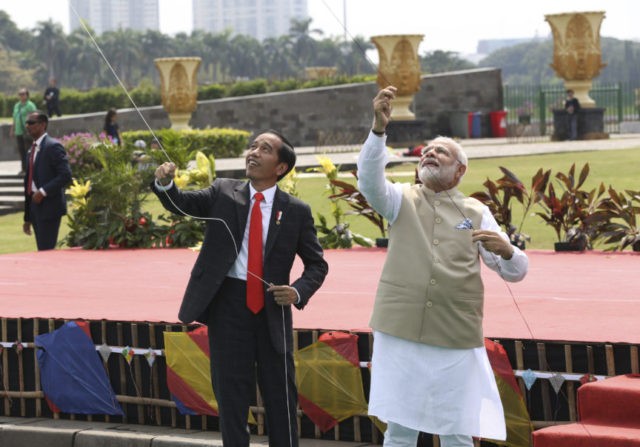India and Indonesia have reportedly embarked on a joint effort to counter China’s expansionism across the Indo-Pacific region with both countries agreeing to step up naval defense and security cooperation, the Times of India reported Thursday.
Both countries outlined their shared effort in a document issued Wednesday amid Indian Prime Minister Narendra Modi’s visit to meet Indonesian President Joko Widodo in Jakarta.
On Thursday, the Times of India (TOI) reported:
India and Indonesia will develop a naval port in Sabang, a strategic location on the tip of Sumatra island and at the entrance of the vital Malacca Straits.
The move, which comes at a time when China is expanding its maritime footprint in the region, was the most significant decision among a series of other pacts the two sides signed after talks between Prime Minister Narendra Modi and President Joko Widodo during the PM’s first visit to Indonesia [on Thursday].
Neglecting their relationship for years despite shared historical and cultural ties, neighboring India and Indonesia have struggled to carve a security partnership, the Diplomat acknowledged.
However, the outlet noted that “the two large democracies in Asia are growing closer as authoritarian China grows more menacing.”
“Both countries are finding convergence on the maritime front, largely due to fears of China’s expansionism,” TOI pointed out.
India, China, and Indonesia are among the nations with the largest populations and fastest-growing large economies in the world, with Indonesia ranking as the globe’s most populous Muslim country.
Indian Prime Minister Narendra Modi and Indonesian President Joko Widodo have also agreed to boost to their trade and investment ties.
Ahead of Modi’s visit to Indonesia, The Diplomat noted that China’s expansionism is driving India and Indonesia “ever more closely,” explaining:
Rapidly evolving regional strategic realities are now forcing India and Indonesia to coordinate their policies ever more closely and after years of neglect; Jakarta is recognizing the role that New Delhi can play in structuring a favorable balance of power in the region.
Neither India nor Indonesia has a direct stake in the South China Sea dispute, but both are reportedly concerned about China’s territorial expansionism. Although Jakarta is not a claimant in the South China Sea disputes, China’s expansive claims to most of the region appear to overlap with part of Indonesia’s maritime exclusive economic zone around the Natuna Islands.
The Diplomat pointed out:
Where India is worried about the security of the sea lanes of communication in the larger Indo-Pacific area, Indonesia has been concerned about Chinese maritime intrusions near the Natuna islands, which it claims as part of its exclusive economic zone, as well as Chinese attempts in the past to include the island chain in its territorial maps.
When President Widodo visited India in December 2016, he reportedly vowed to intensify India-Indonesia ties.
That year, India and Indonesia blasted Beijing’s aggressive tactics in the South China Sea when they “stressed the importance of resolving disputes by peaceful means, in accordance with universally recognized principles of international law,” The Diplomat reported.
In a joint statement issued during Modi’s visit this week, both countries expressed “a joint point of view and a roadmap for cooperation in economic, defense and cultural fields,” TOI noted.
The Diplomat declared:
[India and Indonesia could] emerge as major maritime powers to ensure a stable maritime order in the region, one that is under stress because of China’s rapid rise and America’s growing reluctance to be the sole guarantor of regional security.
U.S. President Donald Trump has been pushing for “regional ownership” of conflicts, urging countries to invest more in their safety and rely less on the American taxpayer.
India and Indonesia this week expressed a willingness to ensure China upholds international norms dealing with freedom of navigation in the South China Sea.
In their shared vision document, the two nations stressed:
[The] importance of achieving a free, open, transparent, rules-based, peaceful, prosperous and inclusive Indo-Pacific region, where sovereignty and territorial integrity, international law, freedom of navigation and overflight, sustainable development and an open, free, fair and mutually beneficial trade and investment system are respected.
Reuters reports that in a “symbolic nod” to India, the American military on Wednesday renamed its U.S. Pacific Command to U.S. Indo-Pacific Command.
The move underscores “the growing importance of India to the Pentagon,” Reuters learned from U.S. officials.

COMMENTS
Please let us know if you're having issues with commenting.